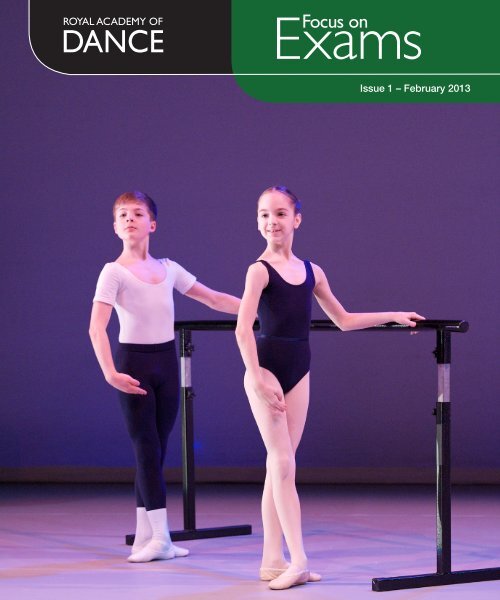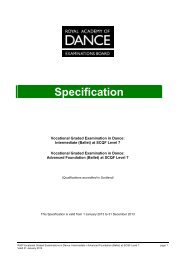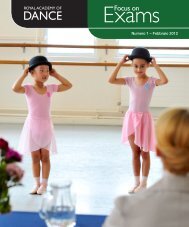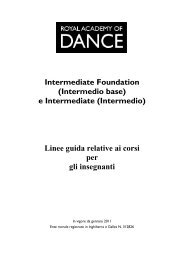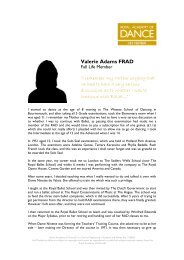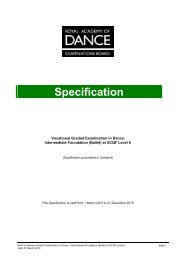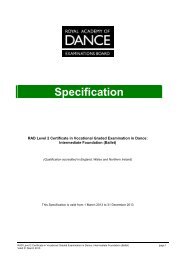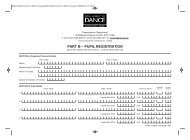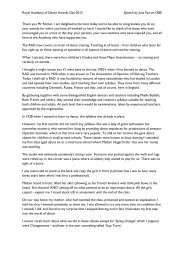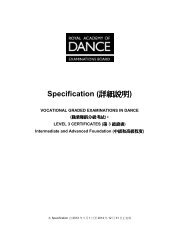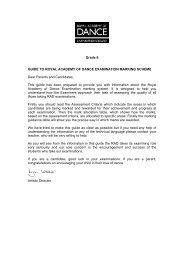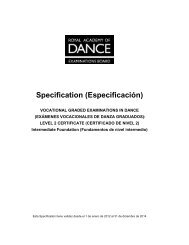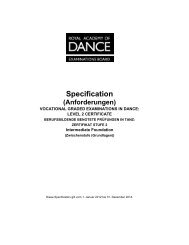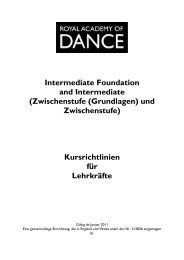English - Royal Academy of Dance
English - Royal Academy of Dance
English - Royal Academy of Dance
Create successful ePaper yourself
Turn your PDF publications into a flip-book with our unique Google optimized e-Paper software.
Exams<br />
Focus on<br />
Issue 1 – February 2013
Contact details<br />
Examinations Department<br />
36 Battersea Square<br />
London SW11 3RA<br />
United Kingdom<br />
tel: +44 (0)20 7326 8000<br />
fax: +44 (0)20 7924 3129<br />
email: exams@rad.org.uk<br />
www.rad.org.uk/examinations<br />
Original Design: Consider This<br />
Typesetting/Translation: ITR<br />
Printer: MWL Print Group Ltd<br />
Photos: Elliott Franks (cover), David Tett (p2, p15),<br />
Brian Slater (p6), Robert Hamlin (p8), Mark Lees (p14)<br />
Focus on Exams is published by the <strong>Royal</strong> <strong>Academy</strong><br />
<strong>of</strong> <strong>Dance</strong>, a charity registered in England and Wales<br />
No 312826 on behalf <strong>of</strong> the worldwide <strong>Royal</strong> <strong>Academy</strong> <strong>of</strong><br />
<strong>Dance</strong> Group. Contact details for RAD Group <strong>of</strong>fices may<br />
be found on pp16-17. VAT Registration Number:<br />
GB 603 1763 71<br />
ROYAL ACADEMY OF DANCE, RAD, RAD PRE-PRIMARY<br />
IN DANCE and RAD PRIMARY IN DANCE are registered<br />
trademarks® <strong>of</strong> the <strong>Royal</strong> <strong>Academy</strong> <strong>of</strong> <strong>Dance</strong>.<br />
RAD INTERMEDIATE FOUNDATION, RAD INTERMEDIATE,<br />
RAD CLASS AWARD and RAD SOLO PERFORMANCE<br />
AWARD are unregistered trademarks <strong>of</strong> the <strong>Royal</strong><br />
<strong>Academy</strong> <strong>of</strong> <strong>Dance</strong>. The use or misuse <strong>of</strong> the trademarks or<br />
any other content <strong>of</strong> this publication, without prior written<br />
permission from the <strong>Royal</strong> <strong>Academy</strong> <strong>of</strong> <strong>Dance</strong> is strictly<br />
prohibited.<br />
Registered Teachers may use and be recognised by<br />
a special Collective Mark: <strong>Royal</strong> <strong>Academy</strong> <strong>of</strong> <strong>Dance</strong><br />
Registered Teachers®<br />
Reproduction in whole or part, without written permission, is<br />
strictly prohibited.<br />
Welcome<br />
Welcome to Focus on Exams, an RAD publication<br />
dedicated entirely to examinations matters. Issued<br />
three times a year with <strong>Dance</strong> Gazette, Focus on<br />
Exams allows the Examinations Board to<br />
communicate regularly and directly with teachers<br />
and candidates around the world, and is your first<br />
point <strong>of</strong> contact for examinations news, updates on<br />
syllabus content, exam procedures, policies,<br />
regulatory information, and anything else <strong>of</strong><br />
relevance to anyone involved with, or planning on<br />
entering for, RAD examinations. We hope you enjoy<br />
reading this issue!<br />
Dr Andrew McBirnie<br />
Director <strong>of</strong> Examinations<br />
We are always keen to know what you think – about this<br />
publication, the new syllabi or any other aspects <strong>of</strong> the<br />
Examinations Board’s work. Please contact us at<br />
exams@rad.org.uk<br />
REGULATORY AND EXTERNAL<br />
Scottish Credit and Qualifications<br />
Framework (SCQF)<br />
The RAD’s examinations in Scotland have been<br />
placed on the Scottish Credit and Qualifications<br />
Framework (SCQF).<br />
Like the Qualifications and Credit Framework (QCF)<br />
in England, Wales and Northern Ireland, the SCQF<br />
assigns a level (degree <strong>of</strong> demand or difficulty) and a<br />
credit value (size or breadth) to each qualification,<br />
creating a framework which provides meaningful<br />
progression, comparison and recognition <strong>of</strong> different<br />
types <strong>of</strong> learning and qualifications for learners,<br />
teachers, educational institutions such as schools<br />
and colleges, and employers.<br />
Successful RAD exam candidates in Scotland will<br />
now be awarded credit for their examinations. Credit<br />
is a recognised unit <strong>of</strong> educational currency which<br />
can be accumulated and transferred, both within the<br />
framework itself and, on a discretionary basis,<br />
elsewhere. For example, credit achieved as a result<br />
<strong>of</strong> passing an RAD examination could potentially be<br />
put towards another relevant Scottish qualification<br />
such as a Higher in <strong>Dance</strong>, so long as this is agreed<br />
by both providers.<br />
The full details <strong>of</strong> the levels and credits assigned to<br />
RAD examinations in Scotland are as follows:<br />
Examination SCQF level SCQF credit<br />
value<br />
Grade 1 3 5<br />
Grade 2 4 5<br />
Grade 3 4 7<br />
Grade 4 4 7<br />
Grade 5 5 10<br />
Grade 6 6 11<br />
Grade 7 6 11<br />
Grade 8 6 14<br />
Intermediate Foundation 6 21<br />
Intermediate 7 24<br />
Advanced Foundation 7 24<br />
Advanced 1 8 37<br />
Advanced 2 8 37<br />
Louise Murray, RAD Registered Teacher and<br />
Trustee, said: “I am delighted that RAD exams are<br />
now aligned on the SCQF as it is another step<br />
towards dance being valued as a legitimate subject<br />
in its own right. RAD students are now able to gain<br />
recognition for the hard work they put in to their<br />
ballet classes.”<br />
The RAD Examinations Board currently awards QCF<br />
qualifications for all candidates worldwide, with the<br />
exception <strong>of</strong> Scotland where qualifications are<br />
awarded on the SCQF. We continue to explore the<br />
possibilities <strong>of</strong> aligning our examinations to other<br />
national frameworks around the world, so that the<br />
qualifications which candidates receive can become<br />
more meaningful to them in the country where they<br />
live.<br />
Personal Learning Record<br />
Following the article about the Personal Learning<br />
Record (PLR) in the last issue <strong>of</strong> Focus on Exams,<br />
we would like to draw your attention to the following<br />
data protection information.<br />
Where a candidate supplies us with a ULN (Unique<br />
Learner Number), the RAD will normally contact that<br />
candidate (via their teacher) to determine whether<br />
the candidate wishes us to upload their details to<br />
the PLR and/or the Diploma Aggregation Service<br />
(DAS) in respect <strong>of</strong> the 14-19 Diploma in England.<br />
With respect to the PLR, please note that some <strong>of</strong><br />
the information supplied will be used by the Skills<br />
Funding Agency (SFA - which is responsible for<br />
maintaining the PLR) to fulfil its statutory functions,<br />
issue/verify the candidate’s ULN and update/check<br />
their Personal Learning Record. The SFA may share<br />
the candidate’s ULN and Personal Learning Record<br />
with other organisations, such as their careers<br />
service, school, college or university, Government<br />
Departments and public bodies responsible for<br />
funding their education. Further details <strong>of</strong> how<br />
information is processed and shared can be found<br />
at http://www.learningrecordsservice.org.uk/<br />
documentlibrary/documents/privacynotice.htm<br />
SECTION 1<br />
1
SECTION 1<br />
Funding<br />
Teachers working in the UK may be interested to<br />
note that the alignment <strong>of</strong> the RAD’s examinations<br />
on statutory frameworks means that public funding<br />
can sometimes be made available for learners<br />
studying towards these qualifications.<br />
Funding arrangements are complex, and there are a<br />
number <strong>of</strong> requirements which must be met.<br />
Students must be in full-time education, and<br />
studying for their RAD exam as part <strong>of</strong> an<br />
educational course <strong>of</strong>fered by a recognised public<br />
provider (i.e. not as an ‘extra’ or ‘after school’<br />
activity). They must also normally be at least 16<br />
years old.<br />
In practice, RAD teachers would normally need to be<br />
working in a publicly funded school or college (such<br />
as a Further Education College), or form a<br />
partnership with such an institution. It would be<br />
virtually impossible in practice to receive public<br />
funding for a private dance school. However, we<br />
know <strong>of</strong> at least one example <strong>of</strong> an RAD teacher<br />
who has entered into such a partnership<br />
arrangement.<br />
For more information please contact the<br />
Examinations Department.<br />
POLICY UPDATES AND REMINDERS<br />
Specifications<br />
Revised Specification documentation, including<br />
Examinations Information, Rules and Regulations,<br />
is now available and can be downloaded from<br />
www.rad.org.uk/examinations and local websites.<br />
Please ensure you familiarise yourself with these<br />
important documents.<br />
Policies and guidelines<br />
The Examinations Board continually monitors all its<br />
policies, both published and internal. Each policy is<br />
subject to an annual review; in addition, policies may<br />
need to be updated at other times due to the<br />
requirement <strong>of</strong> the examination regulators. This<br />
process is managed by the Examinations Quality<br />
Assurance Committee, which is chaired by the<br />
Director <strong>of</strong> Examinations, and reports to the Artistic<br />
and Examinations sub-Committee <strong>of</strong> the Board <strong>of</strong><br />
Trustees.<br />
Normally we will only alert you to the detail <strong>of</strong><br />
changes when there is a substantial impact on your<br />
day-to-day involvement with the Examinations<br />
Board.<br />
In recent months, changes and updates to policies<br />
have included:<br />
• Malpractice and Maladministration Policy<br />
(August 2012) – no significant changes.<br />
Candidates entered for a Solo Performance Award<br />
must have passed the preceding Graded<br />
Examination, or any higher grade (e.g. to enter for<br />
Solo Performance Award at Grade 2, the candidate<br />
must have passed the Grade 1 Examination, Grade<br />
2 Examination, or any higher grade including<br />
Vocational Graded Examinations). Candidates may<br />
enter for the Solo Performance Award and the<br />
qualifying Graded Examination in the same session,<br />
but in this event, the award <strong>of</strong> the Solo Performance<br />
Award will be dependent on the Graded Examination<br />
being passed. More information about Solo<br />
Performance Awards was given in the previous<br />
edition <strong>of</strong> Focus on Exams.<br />
Music in examinations: policy and advice<br />
From January 2013, the policy <strong>of</strong> the RAD<br />
Examinations Board with respect to music in<br />
examinations will be as follows:<br />
• For Pre-Primary in <strong>Dance</strong> Class Award, Primary<br />
in <strong>Dance</strong> Examination and Class Award, and<br />
Grades 1-3 Examinations, Class Awards and<br />
Solo Performance Awards, live piano and/or CD<br />
accompaniment may be used according to the<br />
Specification requirements for each<br />
Examination, Class Award or Solo Performance<br />
Award.<br />
• For Grades 4-8 Examinations and Presentation<br />
Classes, live piano music must be used. The use<br />
<strong>of</strong> CD at these levels is not acceptable.<br />
• For Intermediate Foundation and Intermediate<br />
Grades 1-3 Syllabi<br />
Examinations, live piano must be used for the<br />
Exercises and Studies, while CD<br />
accompaniment must be used for the Variations.<br />
The new Grades 1-3 syllabi are now being<br />
examined. The previous Grades 1-3 syllabi ceased<br />
There are no exceptions to this rule.<br />
being examined on 31 December 2012. Grades 1-3 From January 2015, for Grades 4-5 Examinations,<br />
are available as an Examination, Class Award<br />
Class Awards and Solo Performance Awards, live<br />
(replacing the Presentation Class at these levels), piano and/or CD accompaniment may be used<br />
and Solo Performance Award.<br />
according to the Specification requirements for each<br />
2<br />
Examination, Class Award or Solo Performance<br />
Award.<br />
3<br />
SECTION 2
SECTION 2<br />
Also from January 2015, teachers will no longer be<br />
permitted to be the CD operator in examinations.<br />
This function will need to be performed by another<br />
person. This is because Examiners have fed back<br />
that candidates are frequently distracted by the<br />
presence <strong>of</strong> their teacher in the examination. This<br />
can affect their performance, particularly in respect<br />
<strong>of</strong> the alignment <strong>of</strong> head and eyes, and can also<br />
affect the smooth running <strong>of</strong> the examination.<br />
The only CDs which are permitted to be used in<br />
examinations are those which have been produced<br />
specifically for this purpose. These CDs include<br />
instrumental / orchestral tracks, which give<br />
candidates the opportunity <strong>of</strong> performing to a range<br />
<strong>of</strong> musical sounds and timbres other than piano. The<br />
associated choreography has been created<br />
alongside this music.<br />
Other CDs produced by the RAD are essentially for<br />
rehearsal purposes. They are not, and never were,<br />
intended to be an effective substitute for the use <strong>of</strong><br />
live piano. Indeed, the RAD recommends that,<br />
wherever possible, teachers use a live pianist in their<br />
weekly classes, both to enable students to have the<br />
important experience <strong>of</strong> dancing to live music, and<br />
so that the use <strong>of</strong> a live pianist in the examination<br />
– where this is the case – does not come as a shock.<br />
We recognise that in certain localities, there is a<br />
perception that it is becoming increasingly difficult<br />
to find competent and experienced pianists to play<br />
for dance classes and exams. However, it is also the<br />
case that in most towns and cities, there are<br />
accomplished pianists looking for work. Many <strong>of</strong><br />
these pianists may not be experienced in playing for<br />
dance. We recommend that teachers form<br />
partnerships with such pianists and invite them to<br />
work in their schools, so that they can build up their<br />
experience in playing for dance.<br />
Depending on the local market, costs can be built in<br />
to the School’s business model. The most effective<br />
method for managing this, and the one which the<br />
<strong>Academy</strong> recommends, is to spread costs across<br />
the standard lesson charge for all pupils attending<br />
the school, rather to make a one-<strong>of</strong>f charge to<br />
particular students/parents on occasions when a<br />
pianist is used.<br />
This might be <strong>of</strong> particular relevance when, for<br />
example, a school is presenting a number <strong>of</strong><br />
examination sets up to and including Grade 3, for<br />
which the instrumental CD may be used, together<br />
with a small number <strong>of</strong> sets at Grade 4 and above,<br />
for which live piano must be used. As the<br />
opportunities to use CDs in exams increase, there<br />
are associated opportunities to keep these costs<br />
down, and perhaps, therefore, to make use <strong>of</strong><br />
pianists in classes more than might have been<br />
possible previously, and/or to pay a premium rate<br />
where a pianist is contracted for a short amount <strong>of</strong><br />
time.<br />
‘Host teachers’ and ‘guest teachers’<br />
In circumstances where Applicants join together to<br />
hold examinations in one Approved Examination<br />
Centre (AEC), the primary responsibility lies with the<br />
Applicant who normally uses those premises for<br />
examinations (‘host teacher’). Where neither<br />
Applicant uses the premises in this way, primary<br />
responsibility must be agreed between the two<br />
parties and communicated to the relevant RAD<br />
<strong>of</strong>fice. (Examinations Information, Rules and<br />
Regulations, 4.6.3).<br />
• Where a pianist is used, the guest teacher<br />
should clarify whether he/she will bring his/her<br />
own pianist, or if he/she needs to use the host<br />
teacher’s pianist. If the latter, the guest teacher<br />
should determine the preferred method <strong>of</strong><br />
payment, including whether this should be made<br />
directly to the pianist or via the host teacher.<br />
The guest teacher should not assume that the<br />
host teacher will automatically provide a pianist.<br />
If the guest teacher is bringing their own pianist,<br />
he/she should check that there will be a piano<br />
available at the studio.<br />
• The host teacher should ensure that<br />
refreshments are provided for the Examiner and/<br />
or pianist as necessary. The guest teacher<br />
should <strong>of</strong>fer to provide some <strong>of</strong> these<br />
refreshments (depending where breaks are<br />
scheduled) and/or contribute towards their cost.<br />
• The host teacher must ensure that a responsible<br />
Examination Attendant is available at all times<br />
(as per Examinations Information, Rules and<br />
Regulations, 5.1.2). The host teacher should<br />
advise the guest teacher <strong>of</strong> the name/contact<br />
details <strong>of</strong> this person, if they are not themselves<br />
performing this function.<br />
• The host teacher must make sure everything<br />
necessary for the examination day is provided in<br />
the studio, including: Examiner’s table/chair,<br />
pianist’s stool, bell, water/glass, CD equipment,<br />
‘Silence’ notices, etc. Any mirrors must be<br />
covered.<br />
• The host teacher is responsible for ensuring that<br />
the venue is locked at the end <strong>of</strong> day, where<br />
necessary.<br />
Examinations Feedback Seminars<br />
Examinations Feedback Seminars are now being<br />
arranged as part <strong>of</strong> selected examination sessions<br />
worldwide.<br />
These Seminars are led by an RAD Examiner who<br />
will feed back information, in general terms, about<br />
how marks were awarded during the examination<br />
session. There will then be an opportunity to ask<br />
questions. The focus <strong>of</strong> these Seminars is the way in<br />
which Examiners award marks in examinations; they<br />
will not cover advice on teaching.<br />
Seminars are approximately two hours in length and<br />
light refreshments will be provided. It is not a<br />
workshop or class, so there is no need to dress for<br />
practical work.<br />
A fee will be charged for attendance, which covers<br />
the administrative costs <strong>of</strong> holding the Seminar.<br />
Please note that, owing to the generic nature <strong>of</strong> the<br />
information given, nothing stated by an Examiner at<br />
an Examinations Feedback Seminar may be used as<br />
the basis for any enquiry, complaint or appeal about<br />
an examination.<br />
From July 2013 these Seminars will become part <strong>of</strong><br />
the <strong>Academy</strong>’s CPD Scheme, but we hope that all<br />
teachers who attend find them <strong>of</strong> interest, and also<br />
<strong>of</strong> practical use and benefit in terms <strong>of</strong> preparing<br />
candidates for examinations and maximising their<br />
chances <strong>of</strong> success.<br />
The following informal guidelines are <strong>of</strong>fered here as<br />
• If the guest teacher is not personally attending<br />
a means <strong>of</strong> providing advice and clarifying some <strong>of</strong><br />
the examinations, he/she should arrange for a<br />
4<br />
We recognise that there are economic<br />
considerations here. However, in most cases this<br />
should be to some extent <strong>of</strong>fset by the benefits<br />
afforded by extensive live music experience in<br />
classes: not only specifically for those examination<br />
candidates who will dance to live music in the exam,<br />
but for all students, who will understand more about<br />
the live interaction between musician and dancer,<br />
and hence what ballet is as an art form.<br />
the issues which can sometimes arise in these<br />
circumstances:<br />
• A guest teacher should contact the host teacher<br />
within one week <strong>of</strong> receiving confirmation <strong>of</strong> the<br />
date/venue. If a guest teacher has any problems<br />
contacting the host teacher they should notify<br />
the relevant RAD Office as soon as possible.<br />
• The guest teacher should clarify his/her share <strong>of</strong><br />
the costs and the amount <strong>of</strong> time necessary to<br />
hold the examinations. It may be necessary to<br />
speak to the venue manager in order to extend<br />
the hire period.<br />
responsible person to be present and ensure<br />
that their candidates are ready and prepared for<br />
their examinations.<br />
5<br />
SECTION 2
SECTION 2<br />
Certificates, Medals and Bars<br />
At the time <strong>of</strong> writing, the Examinations Board was<br />
in the process <strong>of</strong> redesigning its suite <strong>of</strong> Certificates.<br />
The main change is the incorporation <strong>of</strong> the<br />
signature <strong>of</strong> the new President, Darcey Bussell, on<br />
all Certificates.<br />
We are also planning to include information about<br />
European Qualifications Framework (EQF) levels on<br />
Certificates for regulated qualifications, and there<br />
have also been some minor changes to the design<br />
and layout, in order to ensure that all Certificates,<br />
whether for regulated qualifications or other awards,<br />
are consistent in the way they look.<br />
Certificates in Scotland are also changing, in order<br />
to reflect the new credit-bearing status <strong>of</strong> those<br />
qualifications.<br />
The Examinations Board is now awarding Medals to<br />
all candidates who are successful in examinations<br />
from Primary in <strong>Dance</strong> to Grade 8. Medals are<br />
colour-coded according to the level <strong>of</strong> the<br />
examination, and edged with bronze, silver or gold<br />
according to the result achieved (Pass, Merit or<br />
Distinction).<br />
We are also awarding Medals for Class Awards, and<br />
Bars for Solo Performance Awards. The colours <strong>of</strong><br />
Class Award Medals and Solo Performance Award<br />
Bars correspond to those <strong>of</strong> the Examination<br />
Medals; a new red medal for the Primary in <strong>Dance</strong><br />
Class Award will be introduced during the course <strong>of</strong><br />
2013.<br />
Medals and bars are distributed free <strong>of</strong> charge along<br />
with results and Certificates.<br />
UK School and Candidate Registration<br />
The Pupil and School Registration email address has<br />
been changed from<br />
centreandcandidateregistration@rad.org.uk to<br />
idregistration@rad.org.uk. All requests for school<br />
or candidate ID numbers should be sent to this<br />
address.<br />
REPORT FROM THE PANEL OF EXAMINERS<br />
From 2013 we will be including these Reports in<br />
Focus on Exams, and will also make them available<br />
on RAD websites.<br />
This feedback is drawn from observations recorded<br />
in Examiners’ Tour Reports throughout the world,<br />
and is presented here with some associated<br />
suggestions and advice.<br />
6 7<br />
General<br />
Examiners have seen many candidates performing<br />
the Intermediate Foundation and Intermediate levels<br />
with much enthusiasm, and are now looking forward<br />
to seeing the new Grades 1-3 in action this year.<br />
Secure Knowledge<br />
Examiners <strong>of</strong>ten comment that they see candidates<br />
who appear to have an insecure knowledge <strong>of</strong> the<br />
work. In these situations results are compromised,<br />
as it is difficult for candidates to demonstrate the<br />
required levels <strong>of</strong> technique when trying to<br />
remember sequences throughout the examination.<br />
A possible suggestion to help address this would be<br />
to rotate students for each exercise at the barre<br />
during rehearsals; this would give all students an<br />
opportunity <strong>of</strong> being at the front, and to realise<br />
whether they have been copying rather than taking<br />
responsibility for knowledge <strong>of</strong> the exercise.<br />
Similarly in the centre, we recommend that students<br />
are allowed to rehearse regularly at the front <strong>of</strong> the<br />
class, in order to gain confidence and assurance in<br />
the examination.<br />
Performance Space<br />
Use <strong>of</strong> Performance Space is an important element<br />
<strong>of</strong> assessment, especially for the <strong>Dance</strong>s/Studies<br />
and Variations, when these are performed as a solo.<br />
Candidates should understand that the Examiner is<br />
sitting centre front; this will help them to find the<br />
centre easily. Candidates should be aware that there<br />
are key moments in each <strong>Dance</strong>, Study or Variation<br />
when they should be aligned with centre front.<br />
A good example is Pirouettes en dedans in<br />
Intermediate Foundation and Intermediate.<br />
Candidates should run onto the imaginary stage in<br />
time with the music and position themselves in the<br />
centre for the beginning <strong>of</strong> the exercise. Examiners<br />
have reported that many candidates run well beyond<br />
the centre.<br />
Entrance into the Examination Studio<br />
At all levels the entrance to the examination is not<br />
marked. However, it is most helpful for both the<br />
Examiner and candidates if a positive atmosphere is<br />
created with a swift energetic run into the<br />
examination room and a cheery salutation.<br />
Music<br />
Most candidates generally dance in time with the<br />
music, but fewer manage to obtain a high mark for<br />
the music components, due to a lack <strong>of</strong> appropriate<br />
response to the music. To help them achieve higher<br />
marks, candidates should be aware <strong>of</strong> the criteria<br />
used to mark the response to music. Examiners are<br />
looking for phrasing, dynamics and atmosphere.<br />
SECTION 3
SECTION 3<br />
Performance<br />
Examiners report that candidates still tend to focus<br />
and perform to the Examiner rather than up and<br />
beyond to an imaginary, large audience.<br />
Primary in <strong>Dance</strong> and new Grades 1–3:<br />
Groups <strong>of</strong> three<br />
In sets <strong>of</strong> three, it is preferable if the teacher<br />
organises, prior to the examination day, which<br />
candidates are going to dance in a pair, and who will<br />
dance solo or with one <strong>of</strong> the candidates who has<br />
already danced. This provides familiarity for the<br />
candidates and helps them to dance with more<br />
confidence. Take care if asking the same candidate<br />
to do all the extra dancing: this can compromise the<br />
energy levels <strong>of</strong> this candidate. Giving all candidates<br />
a chance to dance solo or have an extra turn with<br />
another partner is the best approach.<br />
Primary in <strong>Dance</strong>: Transfer <strong>of</strong> Weight<br />
The quality <strong>of</strong> movement required in this step still<br />
appears at times to be misunderstood. It should be<br />
lyrical. It is not an elevated step; the toes do not<br />
come <strong>of</strong>f the floor: the same principle as a glissade.<br />
Intermediate Foundation and Intermediate:<br />
Révérence<br />
The Révérence is performed by one candidate at a<br />
time. At the end <strong>of</strong> each Révérence, the Examiner<br />
will thank the candidate, giving the candidate an<br />
opportunity to respond to the Examiner and thank<br />
the pianist. The same procedure will follow for each<br />
candidate; after the last candidate has performed<br />
the students collect their things and leave the room.<br />
Candidates should not come back into the centre to<br />
perform another Révérence.<br />
SYLLABUS AMENDMENTS<br />
The following amendments have been made to the 2012 reprints <strong>of</strong> syllabus books as indicated. Corrections<br />
have been shaded.<br />
Pre-Primary in <strong>Dance</strong> Class Award and Primary in <strong>Dance</strong> Examination and Class Award:<br />
Exercises and <strong>Dance</strong>s<br />
(First published 2008)<br />
p3 – PP2. LEGS AND FEET<br />
Description <strong>of</strong> correction: Changed ankle flexed from left leg to right leg in bar 1 beat 2. Word notes are<br />
3<br />
unaffected. Benesh notation as follows:<br />
PP2. LEGS AND FEET<br />
Music A: Andante con moto<br />
Music B: Andante con moto<br />
8<br />
Pivot steps<br />
Pivot step de côté en face<br />
Pivot step en tournant<br />
9<br />
<br />
P<br />
D , C<br />
S<br />
or less<br />
INTRO<br />
per (1 bar <strong>of</strong> notation = 1 music bar)<br />
per (1 bar <strong>of</strong> notation = 1 music bar)<br />
or<br />
C3<br />
'hug legs'<br />
%m<br />
Intermediate Foundation: Set Exercises and <strong>Dance</strong>s<br />
(First published 2010)<br />
p5 – VOCABULARY<br />
Description <strong>of</strong> correction: Addition <strong>of</strong> ‘Pivots à terre’ to the vocabulary list as follows:<br />
Pirouettes<br />
En dehors: single from demi-plié in 4th position<br />
En dedans: single from 4th position en fondu<br />
Pivots<br />
Pivots à terre<br />
D<br />
<br />
P<br />
%<br />
Pirouettes<br />
En dehors: single from demi-plié in 4th position<br />
En dedans: single from 4th position en fondu<br />
Single from 4th position en fondu in parallel retiré<br />
Pivots<br />
Pivots à terre<br />
SECTION 4
SECTION 4<br />
p6 – VOCABULARY<br />
Description <strong>of</strong> correction: Addition <strong>of</strong> ‘Temps liés’ to the vocabulary list as follows:<br />
Temps levés<br />
Temps levés in attitude devant<br />
Temps levés with low développé passé devant<br />
Temps levés in parallel retiré<br />
Temps levés in retire derrière<br />
Temps levés in 1st and 2nd arabesque<br />
Temps liés<br />
Basic temps lié en avant<br />
Basic temps lié to 2nd<br />
Temps levés<br />
Temps levés in attitude devant<br />
Temps levés in parallel retiré<br />
Temps levés in 1st and 2nd arabesque<br />
Temps liés<br />
Basic temps lié en avant<br />
Basic temps lié to 2nd<br />
Tours en l’air<br />
Single tour en l’air<br />
p24 and 25 – CENTRE PRACTICE – PORT DE BRAS – MALE AND FEMALE<br />
Description <strong>of</strong> correction: Change <strong>of</strong> wording in 3rd counts 1-8 <strong>of</strong> Port de bras (IF-09) as follows:<br />
& Close 5th devant Bras bas<br />
1-4 Basic temps lié en avant closing en face Basic port de bras<br />
5-8 Basic temps lié to 2nd closing en croisé Basic port de bras Head erect on count 8<br />
p30 – PIROUETTE EN DEDANS – MALE AND FEMALE<br />
Description <strong>of</strong> correction: Change <strong>of</strong> wording in 1st counts 5&a6 <strong>of</strong> Pirouettes en dedans (IF-11) as follows:<br />
5&a6 Chassé de côté toward 7 and pas de Arms through 2nd to bras bas Head to<br />
bourrée dessous right and erect<br />
p38 – ALLEGRO 2 – MALE AND FEMALE<br />
Description <strong>of</strong> correction: Insertion <strong>of</strong> ‘to 2nd’ in wording for 2nd counts 1-2 <strong>of</strong> Allegro 2 (IF-14) as follows:<br />
1-2 Echappé sauté battu fermé to 2nd with Arms to demi-seconde and bras bas<br />
change <strong>of</strong> feet<br />
p72 - POINTE WORK BARRE<br />
Description <strong>of</strong> correction: Correction in the number <strong>of</strong> counts per bar as follows:<br />
RISES IF-22<br />
2<br />
4 2 counts = 1 bar<br />
Commence: Facing barre 1st position Bras bas<br />
p73 - POINTE WORK BARRE<br />
Description <strong>of</strong> correction: Amendment to time signature in the notation which requires a complete re-layout <strong>of</strong><br />
the Benesh notation as follows:<br />
10 11<br />
RISES<br />
Moderato<br />
<br />
%<br />
INTRO<br />
% %<br />
8 BARS<br />
¡<br />
<br />
%I % %I<br />
%<br />
*<br />
IN SILENCE<br />
SECTION 4
SECTION 4<br />
Intermediate: Set Exercises and <strong>Dance</strong>s<br />
(First published 2010)<br />
p4 – VOCABULARY<br />
Description <strong>of</strong> correction: Insertion <strong>of</strong> ‘Fouetté à terre’ into the vocabulary list as follows:<br />
Fouettés<br />
Fouetté à terre<br />
Fouetté <strong>of</strong> adage<br />
Coupé fouetté raccourci sauté<br />
Coupé fouetté raccourci en pointe<br />
p28 – ADAGE<br />
Fouettés<br />
Fouetté à terre<br />
Fouetté <strong>of</strong> adage<br />
Coupé fouetté raccourci sauté<br />
Description <strong>of</strong> correction: Barre Adage (I-09) 2nd count &a7 wording change to ‘Fouetté à terre’ as follows:<br />
&a7 Fouetté à terre to face other side Arm through 1st to 2nd<br />
p39 – PIROUETTES EN DEDANS & POSE PIROUETTES – FEMALE<br />
Description <strong>of</strong> correction: Pirouette en dedans (I-13). Slight change in the Benesh notation <strong>of</strong> chassé de côté<br />
on 1st count 7 to better match word description, as follows:<br />
PIROUETTES EN DEDANS & POSE PIROUETTES - FEMALE<br />
Tempo di Valse<br />
%I<br />
%I<br />
"<br />
INTRO<br />
&<br />
% %I %m<br />
%<br />
12 13<br />
%I<br />
'<br />
$H<br />
8 BARS<br />
h h<br />
% %I<br />
%I<br />
% %R<br />
&<br />
&<br />
q<br />
p46 – ALLEGRO 1 – MALE AND FEMALE<br />
Description <strong>of</strong> correction: Allegro 1 (I-15) 2nd counts 1-2 and 5-6 wording changes from ‘in 4th’ to ‘to 4th’ as<br />
follows:<br />
1-2 Echappé sauté fermé to 4th Arms through 1st to 3rd right arm<br />
forward Head to right hand<br />
3-4 Echappé sauté fermé to 2nd with change Arms 2nd and bras bas<br />
<strong>of</strong> feet to face 1 closing en croisé<br />
5-6 Echappé sauté fermé to 4th Arms through 1st to 3rd left arm forward<br />
and bras bas Head to left hand<br />
p50 – ALLEGRO 3 – MALE AND FEMALE<br />
Description <strong>of</strong> correction: Allegro 3 (I-17) 1st count 2 add ‘en avant’ as follows:<br />
&1& Coupé dessous posé en avant and temps Arms through 1st to 1st arabesque<br />
levé in 1st arabesque facing 6<br />
2 Chassé passé en avant<br />
p54 – ALLEGRO 4 – MALE<br />
Description <strong>of</strong> correction: Allegro 4 (I-18) 1st count 1-2 add ‘to 2nd’ as follows:<br />
1-2 Grand échappé sauté battu fermé to 2nd Basic port de bras<br />
with change <strong>of</strong> feet<br />
3-4 Repeat to other side<br />
SECTION 4
SECTION 5<br />
SUCCESSFUL SOLO SEAL AWARD CANDIDATES<br />
July 2012 to October 2012<br />
Congratulations to the following:<br />
Australia<br />
Robyn Begg<br />
Harry Davis<br />
Kendal Davis<br />
Danika Lampitt<br />
Latisha Sparks<br />
New Zealand<br />
Ariana Hond<br />
Olivia James-Baird<br />
PANEL OF EXAMINERS<br />
It is with great sadness that we said farewell to seven Examiners at the end <strong>of</strong> 2012. In recognition <strong>of</strong> many<br />
years <strong>of</strong> loyal service, the <strong>Royal</strong> <strong>Academy</strong> <strong>of</strong> <strong>Dance</strong> extends sincere thanks and appreciation to:<br />
Heather Long, RAD Vocational Grades Examiner, UK<br />
Jean Nuckey, RAD Vocational Grades Examiner, UK<br />
Joahne O'Hara, RAD Vocational Grades Examiner, UK<br />
Patricia Stirling, RAD Dual Examiner, Australia<br />
Roberta Waal, RAD Examiner, Canada<br />
Debra Wayne, RAD Vocational Grades Examiner, Spain<br />
Jean Wong, RAD Examiner, Hong Kong<br />
14 15<br />
SECTION 6
EXAMINATIONS – CONTACTS<br />
UK Headquarters<br />
<strong>Royal</strong> <strong>Academy</strong> <strong>of</strong> <strong>Dance</strong><br />
Examinations Department<br />
36 Battersea Square<br />
London SW11 3RA<br />
exams@rad.org.uk / t: +44 (0)20 7326 8000 / f: +44 (0)20 7924 2311<br />
www.rad.org.uk<br />
Director <strong>of</strong> Examinations<br />
Dr Andrew McBirnie<br />
amcbirnie@rad.org.uk / t: +44 (0)20 7326 8088<br />
Head <strong>of</strong> Examinations<br />
Gillian Sowerby<br />
gsowerby@rad.org.uk / t: +44 (0)20 7326 8057<br />
Examinations Operations Manager<br />
Harriet Grant<br />
hgrant@rad.org.uk / t: +44 (0)20 7326 8009<br />
Examinations Results Manager<br />
Mark Rogers<br />
mrogers@rad.org.uk / t: +44 (0)20 7326 8055<br />
Examinations Resources Manager<br />
Tatum Dunn<br />
tdunn@rad.org.uk / t: +44 (0)20 7326 8006<br />
Examinations Officer<br />
(London, Middlesex and UK Specials)<br />
Sandra Elphinston<br />
selphinston@rad.org.uk / t: +44 (0)20 7326 8056<br />
Examinations Officer (UK Vocational Graded)<br />
Brenda Strong<br />
bstrong@rad.org.uk / t: +44 (0)20 7326 8008<br />
Examinations Officer (International)<br />
Sara-Jane Mulryan<br />
smulryan@rad.org.uk / t: +44 (0)20 7326 8007<br />
Examinations Administrative Officer<br />
Louise Marshall<br />
lmarshall@rad.org.uk / t: +44 (0)20 7326 8037<br />
Examinations Administrator<br />
Joanna Pigeon<br />
jpigeon@rad.org.uk / t: +44 (0)20 7326 8909<br />
Examinations Results Officer<br />
Monica Camara<br />
mcamara@rad.org.uk / t: +44 (0)20 7326 8050<br />
Examinations Data Processing Supervisor<br />
Andrew Milton<br />
amilton@rad.org.uk / t: +44 (0)20 7326 8906<br />
UK – Regional Offices:<br />
Scotland<br />
Regional Manager: Jennifer MacFarlane<br />
jmacfarlane@rad.org.uk / t: +44 (0)1314 455 455<br />
Northern England<br />
Regional Manager: Debbie White<br />
dwhite@rad.org.uk / t: +44 (0)1668 213 353<br />
Midlands and East <strong>of</strong> England<br />
Regional Manager: Julie Bowers<br />
jbowers@rad.org.uk / t: +44 (0)1782 681 229<br />
16 Greece<br />
17<br />
South West England, Wales & Channel Islands<br />
Regional Manager: Claire Marks<br />
cmarks@rad.org.uk / t: +44 (0)1984 667 533 / f: +44 (0)1490 460594<br />
South East England<br />
Regional Manager: Sue Morice-Jones<br />
smorice-jones@rad.org.uk / t: +44 (0)1634 305 573<br />
Northern Ireland<br />
Area Organiser: Millicent Brown<br />
millicent.brown26@btinternet.com / t: +44 (0)289 042 5187<br />
International Offices:<br />
Australia & Papua New Guinea<br />
Examinations & Training Manager: Kathryn Hughes<br />
khughes@rad.org.au / t: +61 2 9380 1908 / f: +61 2 9360 6677<br />
www.rad.org.au<br />
Benelux and France<br />
<strong>Royal</strong> <strong>Academy</strong> <strong>of</strong> <strong>Dance</strong> Asbl<br />
National Director: Jacqueline Spence<br />
RAD-Benelux@pt.lu / t: +352 787225 / f: +352 787217<br />
RAD-France@pt.lu / www.rad.lu<br />
Bermuda<br />
Examinations Officer (International): Sara-Jane Mulryan<br />
exams@rad.org.uk / t: +44 (0)20 7326 8000 / f: +44 (0)20 7924 3129<br />
Brazil, Peru, Ecuador & Chile<br />
<strong>Royal</strong> <strong>Academy</strong> <strong>of</strong> <strong>Dance</strong> Brasil Ltda<br />
National Director: Maria do Carmo de Kenny<br />
mckenny@royalacademy<strong>of</strong>dance.com.br / t/f: +55 19 3892 3985<br />
www.royalacademy<strong>of</strong>dance.com.br<br />
Brunei<br />
Examinations Officer (International): Sara-Jane Mulryan<br />
exams@rad.org.uk / t: +44 (0)20 7326 8000 / f: +44 (0)20 7924 3129<br />
Canada<br />
Manager, Graded Examinations: Mary Jane Collins<br />
t: +1 416 489 2813 ext. 224<br />
Manager, Vocational Graded Examinations: Lenore Orantia<br />
t: +1 416 489 2813 ext. 225<br />
info@radcanada.org / t: +1 416 489 2813 / f: +1 416 489 3222<br />
www.radcanada.org<br />
Caribbean (Jamaica, Guadeloupe, Bahamas,<br />
Trinidad and Tobago, Barbados, St Lucia and Antigua)<br />
National Manager: Diane C Bernard<br />
dianebernard@rad.org.jm / t/f: +1 876 755 0612<br />
China<br />
radchina@hotmail.com / t: 86 21 6597 6399 / f: 86 21 6513 7188<br />
Chief Representative: Pr<strong>of</strong>essor Ting Tina Chen<br />
liandtina@gmail.com / t: 86 21 6598 9068<br />
Shanghai & Eastern China: Miss Ying Wang<br />
w_y_1957@hotmail.com / t: 86 21 62483326<br />
All other areas: Miss Ying Xi Chen<br />
radchina@hotmail.com / t: 86 21 63600998 – 808 (General Enquiry)<br />
Cyprus<br />
National Manager: George Shantos<br />
info@rad.com.cy / t: +357 99 477 887 / f: +357 24 818 351<br />
www.rad.com.cy<br />
Germany, Austria and Switzerland<br />
National Director: Horst Vollmer<br />
<strong>Royal</strong> <strong>Academy</strong> <strong>of</strong> <strong>Dance</strong> gGmbH<br />
pruefungen@royalacademy<strong>of</strong>dance.de / t: +49 (0)30 39 40 466 60 /<br />
f: +49 (0)30 39 40 466 69<br />
www.royalacademy<strong>of</strong>dance.de<br />
Ghana<br />
Examinations Officer (International): Sara-Jane Mulryan<br />
exams@rad.org.uk / t: +44 (0)20 7326 8000 / f: +44 (0)20 7924 3129<br />
The British Council<br />
RAD Representative: Veta Anastasopoulou<br />
rad@britishcouncil.gr / t: +30 210 364 3691 / f: +30 210 363 0332<br />
Hong Kong<br />
Hong Kong Examinations & Assessment Authority<br />
International and Pr<strong>of</strong>essional Examinations Division<br />
ie7@hkeaa.edu.hk / t: +852 3628 8761 / f: +852 3628 8790<br />
India<br />
Examinations Officer (International): Sara-Jane Mulryan<br />
exams@rad.org.uk / t: +44 (0)20 7326 8000 / f: +44 (0)20 7924 3129<br />
Indonesia<br />
Yayasan <strong>Royal</strong> <strong>Academy</strong> <strong>of</strong> <strong>Dance</strong> Indonesia<br />
National Director: Lala Salendu<br />
radindonesia@cbn.net.id / t: +62 21 75 90 93 63 /<br />
f: +62 21 75 90 93 70<br />
Ireland<br />
National Manager: Beverley Dinsmore<br />
bdinsmore@rad.ie / t: (353) 419 811 915<br />
Israel<br />
<strong>Royal</strong> <strong>Academy</strong> <strong>of</strong> <strong>Dance</strong> Israel<br />
National Manager: Gali Zamir<br />
gali@rad.org.il / t: +972 52 3343838 / f: +972 77 4702124<br />
Italy<br />
<strong>Royal</strong> <strong>Academy</strong> <strong>of</strong> <strong>Dance</strong> Srl<br />
National Director: Manuela De Luca<br />
info@raditaly.it / t: +39 0461 985 055 / f: +39 0461 985 054<br />
www.raditaly.it<br />
Japan<br />
National Director: Noriko Kobayashi<br />
radjapan@nifty.com / t: +81 3 3987 3750 / f: +81 3 3987 3649<br />
Jordan<br />
Examinations Officer (International): Sara-Jane Mulryan<br />
exams@rad.org.uk / t: +44 (0)20 7326 8000 / f: +44 (0)20 7924 3129<br />
Kuwait<br />
Examinations Officer (International): Sara-Jane Mulryan<br />
exams@rad.org.uk / t: +44 (0)20 7326 8000 / f: +44 (0)20 7924 3129<br />
Lebanon<br />
Examinations Officer (International): Sara-Jane Mulryan<br />
exams@rad.org.uk / t: +44 (0)20 7326 8000 / f: +44 (0)20 7924 3129<br />
Macau<br />
Examinations Officer (International): Sara-Jane Mulryan<br />
exams@rad.org.uk / t: +44 (0)20 7326 8000 / f: +44 (0)20 7924 3129<br />
Malaysia<br />
RAD Dancing (Malaysia) Sdn Bhd<br />
National Director: Mrs Zafriah Ahmad<br />
radmalaysia@gmail.com / t: +60 3 7728 4200 / f: +60 3 7726 8480<br />
Malta<br />
National Manager: Sandra Mifsud<br />
info@rad.org.mt / t: (356) 7993 8584<br />
www.rad.org.mt<br />
Mexico, El Salvador, Honduras, Costa Rica,<br />
Guatemala, Panama<br />
<strong>Royal</strong> <strong>Academy</strong> <strong>of</strong> <strong>Dance</strong> de Mexico AC<br />
National Director: Julieta Navarro<br />
radmexju@prodigy.net.mx / t: +52 55 5560 5355 / f: +52 55 5373 4069<br />
New Zealand<br />
National Director: Janet Taylor<br />
info@rad.org.nz / t: +64 4 382 8924 / f: +64 4 382 8200<br />
www.rad.org.nz<br />
Norway, Sweden & Denmark<br />
National Manager: Mrs Karina Lund<br />
klund@royalacademy<strong>of</strong>dance.no / t: +47 95920812<br />
www.royalacademy<strong>of</strong>dance.no<br />
Philippines<br />
The British Council<br />
Examination Services Officer: Lauren Ann Pascua<br />
lauren.pascua@britishcouncil.org.ph / t: +63 (2) 9141011-14 ext 147 /<br />
f: +63 (2) 6373231<br />
www.britishcouncil.org.ph<br />
Portugal<br />
National Director: Margarida Sa Fialho<br />
radportugal@rad.org.pt / t/f: +351 21 383 1849<br />
Singapore<br />
<strong>Royal</strong> <strong>Academy</strong> <strong>of</strong> <strong>Dance</strong> Singapore<br />
National Director: Mona Lim<br />
mona.lim@rad.sg / t: +65 6762 8993 / f: +65 6762 4031<br />
www.rad.sg<br />
South Africa, Botswana, Kenya, Mauritius,<br />
Mozambique, Namibia, Swaziland & Zimbabwe<br />
AEC Tour Co-ordinator: Lorraine Redmayne<br />
lredmayne@rad.org.za / t: +27 (0)11 887 0459<br />
RAV Tour Co-ordinator: Idalina Lume<br />
ilume@rad.org.za / t: +27 (0)11 887 0459<br />
info@rad.org.za / www.rad.org.za<br />
South Korea<br />
RAD Representative: Hyun Joo Ham<br />
hjhradkr@msn.com / t/f: +82 2 532 1910<br />
www.radkorea.org<br />
Spain, Andorra & Gibraltar<br />
<strong>Royal</strong> <strong>Academy</strong> <strong>of</strong> <strong>Dance</strong> SL<br />
National Director: Maria José Antón<br />
info@rad.org.es / t: +34 977 34 24 89 / t/f: +34 977 34 19 35<br />
www.rad.org.es<br />
Sri Lanka<br />
The British Council<br />
RAD Representative: Ranmali Mirchandani<br />
ranmali.mirchandani@britishcouncil.org / t: +94 11 452 1538 /<br />
f: +94 11 258 7079<br />
Taiwan<br />
National Manager: Shu-Yu Lin<br />
linshuyu82@hotmail.com / t: +886 22 871 5615 / f: +886 22 874 7783<br />
www.rad.org.tw<br />
Thailand<br />
RAD Dancing (Thailand) Co Ltd<br />
National Director: Glenn van der H<strong>of</strong>f<br />
info@radthailand.org / t/f: +6653 274841 / mobile: +6681564 562<br />
www.radthailand.org<br />
Turkey<br />
The British Council<br />
RAD Representative: Merve Kalyoncu<br />
merve.kalyoncu@britishcouncil.org.tr /<br />
t: +90 212 355 56 26 – 355 56 57<br />
United Arab Emirates, Bahrain, Qatar & Oman<br />
The British Council<br />
RAD Representative: Faza Ali<br />
Faza.Ali@ae.britishcouncil.org / t: +971 4 4259 547 /<br />
t: +971 600 529 995<br />
www.britishcouncil.org/me<br />
United States <strong>of</strong> America<br />
National Director: Patti Ashby<br />
info@radusa.org / t: +1 414 747 9060 / f: +1 414 747 9062<br />
www.radusa.org<br />
EXAMINATIONS – CONTACTS
www.rad.org.uk<br />
www.radenterprises.co.uk<br />
www.twitter.com/RADheadquarters<br />
www.facebook.com/<strong>Royal</strong><strong>Academy</strong><strong>of</strong><strong>Dance</strong><br />
<strong>Royal</strong> <strong>Academy</strong> <strong>of</strong> <strong>Dance</strong>® is a charity registered in England and Wales No. 312826


